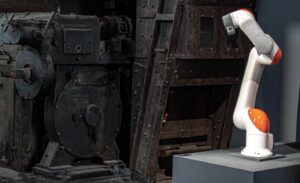By Liam Kemp
4th August 2022 | Edison Search
Did you know the computer used to conduct the Apollo 11 space mission in 1969 had a chip with 64kb of ram operating at 0.043MHz? For comparison – a modern iPhone 12 has 4GB (4,000,000kb) of ram operating at 1900MHz. That’s 44,186 times more powerful than the computer that was used to get a space team to the moon and back safely! The computer was also $3.5m (Equivalent to $27,875,640 with inflation) and the size of a car. That £1,000 iPhone price tag suddenly doesn’t seem too bad!
The first ever computer was invented in 1822 by Charles Babbage, an English mathematician and inventor. It was originally used to automate mathematic calculations and was essentially a basic calculator to assist Charles with his work.
The strides we’ve made in technology over the last 50 years far outweigh the progress that was made in computing power between 1822-1969 – so what has caused the exponential growth in this sector since that Apollo 11 mission?
Technological evolution is exponential rather than linear. This means the more it advances – the faster it advances. This is thanks to a lot of different factors, but one of the main factors is that each generation of technology improves (usually drastically) over the last, while standing on the shoulders of its predecessors. Simply put – each new invention and discovery helps to make the growth even more exponential.
Because of this, we’re at the cusp of what is going to be a very exciting era for technology. AI is getting smarter, products are becoming more innovative and every day tech like an apple watch can legitimately save lives by notifying emergency services and contacts of falls if the subject has been immobile for 1 minute after falling. This is just the start though – The watch can already read an accurate blood pressure and heart rate and the data is trusted by doctors. Soon I’m sure the watch will be used to call emergency services during heart attacks, blood clots and much more.
So what does this mean for the future? Peter Diamandis, an American Engineer and Physician believes that we will ‘re-invent every industry’ in the next 10 years – Making more progress than we have in the last 100 years. The reason? Computing. Whether it being classical or quantum computing, will continue to become faster, cheaper and smaller, as a result the technologies that use them will also become more capable. For example, communication networks, sensors, robotics, and AI are all exponentially improving – but they are also being crossed and merged: for example AI with robotics, which helps to accelerate growth. All of these aspects are the main driving factors of why technology is improving so rapidly.
The amount of connected devices has increased from 8.4B in 2017, to 14.4B in 2022. (That’s nearly double the world’s population!) So how is the future of IoT going to assist us? I think it’s important to first understand exactly what IoT is. IoT is essentially a full system of interconnected computing devices with a UID (Unique ID) assigned to each device. This allows IoT applications to transfer the data automatically without human-to-human, or human-to-machine interaction. As you can imagine – this has endless possibilities for usage, and can eliminate time spent on manual data entry tasks. Hence improving business efficiencies and cutting drastic costs throughout the process.
All things considered, I think IoT will continue to make lives easier, businesses more efficient, and free up a lot of time which can be used for something more productive. For example – Imagine a hospital running on entirely connected devices. Patient data would be stored and analytics would run automatically for the doctor or authority to check from anywhere, without the need of human interaction. This just makes the whole process much more streamlined, eliminates human error and Is also much more cost effective. The application of a hospital with entirely connected devices would give caregivers the ability to access real-time data which can be used to make informed decisions and provide evidence based treatments, thus heightening the success rate of patient treatments.
In my opinion, these advancements will only aid in creating a better quality of life, higher productivity and improved education. All while solving complex problems that our tiny brains simply can’t fathom. Some people are fearful of the power technology, AI and robotics could hold in the future, and whether it will benefit or hinder society.
What do you think?


